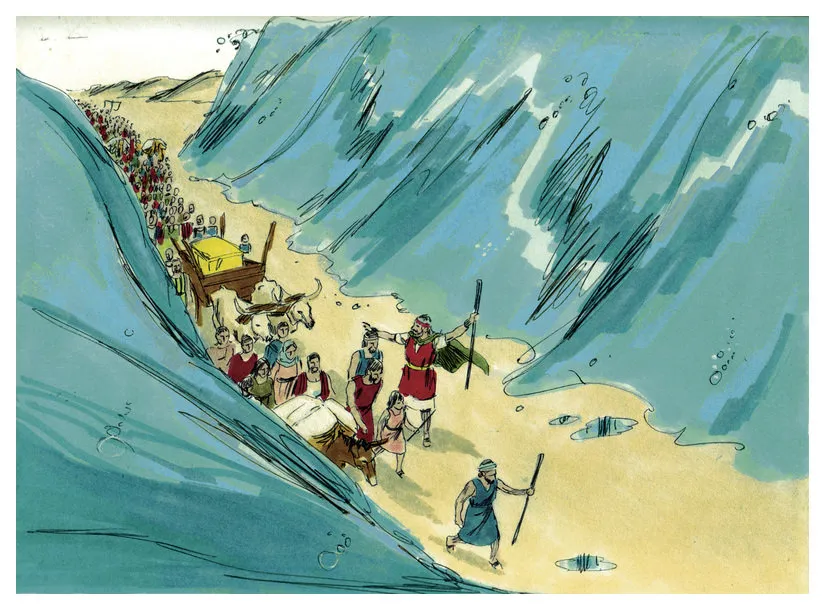The Bible, a book filled with symbolic narratives and prophetic visions, often mentions the mighty Euphrates River. You might wonder, what does the bible say will happen after the Euphrates River dries up? Well, it’s quite a story.
According to Revelation 16:12, when the sixth angel pours out his bowl on the great river Euphrates, its water will dry up to prepare the way for kings from the East. This is seen as paving the path for Armageddon – the final battle between good and evil before Judgment Day.

But don’t be alarmed! It’s important to remember that biblical prophecies are open to interpretation. Some see it literally while others view it symbolically. After all, they’re meant not just as predictions but also as messages of hope and guidance in navigating life’s many challenges.
Understanding the Euphrates River in Biblical Context
When you dive into the Bible’s text, it’s clear that the Euphrates River holds a significant place. Often mentioned in Genesis, where it’s described as one of four rivers branching from the river flowing out of Eden. History buffs might be fascinated to learn that this places it right at humanity’s cradle!

But what happens when we flip to Revelation? There’s something intriguing there. The scripture prophesies that “the water of the river was dried up, to prepare the way for the kings from the East” (Revelation 16:12). Now doesn’t that spark curiosity? What could happen after this mighty river dries up?
In biblical prophecies, water often symbolizes life and prosperity. So when a crucial river like Euphrates dries up, it implies an arrival of desolation or judgment. It’s not meant to paint an apocalyptic picture but rather to emphasize a transition phase preceding God’s ultimate victory.
This prophecy also introduces ‘the kings from the East’. Scholars have varying interpretations about who they are. Some believe these kings represent powerful nations set on causing havoc; others think they are God’s instruments for executing judgment.
So here we are – with a key river running dry and mysterious eastern kings on their way – thrown into a whirlwind of unfolding events! The drying up of Euphrates is more than just ecological change; it signifies major shifts on spiritual and geopolitical fronts according to Biblical context.
And remember folks, these interpretations aren’t set in stone! They’re merely attempts at understanding centuries-old texts shrouded in mystery and symbolism. As you delve deeper into these fascinating scriptures, don’t forget – questioning is part-and-parcel of your exploration journey!
Interpreting Prophecies: The Drying of the Euphrates River
Diving right into it, let’s talk about what happens after the Euphrates River dries up according to biblical prophecy. It’s not a minor event, folks. In fact, it’s described in stark detail in the Book of Revelation (16:12). There, we’re told that the waterway will dry up to prepare a path for kings from “the East”. Many interpret this as symbolic language suggesting a way being made for armies to cross over for an epic battle.
Now these prophecies aren’t typically clear-cut and they often spark heated debates among scholars and believers alike. Some theorize that this drying up signifies an end time war – potentially World War III. Others suggest it may be more metaphorical, pointing towards political or social changes in the nations surrounding the river.
Keep in mind though, that while we’re focusing on interpretations here, there are also literal examples of rivers drying up in history due to natural causes like droughts or human intervention such as dam construction. So is Revelation predicting an actual physical event? Or is it speaking metaphorically about geopolitical shifts?
Let’s dig deeper. When you read further into Revelation 16 (specifically verses 13-16), you’ll notice mention of three unclean spirits shaped like frogs which are said to gather kings for battle at a place called Armageddon after the river dries up.
Here’s what those passages say:
- Verse 13: He saw three unclean spirits that looked like frogs leap from the mouths of the dragon, beast, and false prophet.
- Verse 14: They’re demonic spirits performing signs who go abroad to the kings of the whole world to assemble them for battle on God’s great day.
- Verse 15: Behold! I am coming like a thief! Blessed is he who stays awake, keeping his garments on so that he may not go about naked and be seen exposed!
- Verse 16: They assembled the kings at the place in Hebrew called Armageddon.

These verses have led some to connect the drying of the Euphrates with apocalyptic events or end time battles. However, as with all biblical prophecies, it’s important to remember that multiple interpretations exist and careful study is necessary. No matter what perspective you take on this prophecy, one thing’s clear: there’s more to the story than just a river going dry!
Implications of a Dried-Up Euphrates River in End Times
Diving right into it, let’s take a peek at what the Bible says about the Euphrates River drying up. In Revelation 16:12, it’s distinctly mentioned that “the sixth angel poured out his bowl on the great river Euphrates, and its water was dried up to prepare the way for the kings from the East.” This might seem like a cryptic prophecy to some folks. Yet there are many who believe this event signals an important stage in end times.
For starters, they see it as preparing the path for an impending conflict often referred to as Armageddon. Biblical scholars suggest that these ‘kings from the East’ could symbolize an alliance of Eastern nations. With a dried-up Euphrates River, armies would supposedly find it easier to march westwards towards Israel where this epic battle is prophesied to occur.
Now here’s something interesting! The idea of geographical barriers being removed has been seen before. Picture Moses and his people crossing a parted Red Sea or Joshua leading tribes across a dry Jordan river bed during flood season! It seems when God wants folks to move, bodies of water don’t pose much of a problem!
The drying up of such an important water source also triggers thoughts about environmental implications. Historically, rivers have played crucial roles in civilizations’ growth – providing sustenance and enabling trade routes. If you’re familiar with geography, you’d know that many major cities continue to thrive along river banks even today! By extension then, one could infer that when these waters cease flowing – life changes dramatically; possibly heralding famine and economic collapse.
However, be mindful not to read too literally into all this doom and gloom! Remember we’re dealing with symbolic language here that’s open to interpretation. Some theologians propose that ‘drying up’ may symbolize the waning influence of certain political powers or ideologies. In this view, ‘kings from the East’ could represent new world leaders or movements rising to prominence.
To sum it up, whether you see it as a literal drying up of a river paving way for a major conflict, an environmental catastrophe affecting life and economies, or an allegory for shifting global power dynamics – there’s no denying that the dried-up Euphrates River carries significant implications in biblical end times narratives.
Biblical Perspectives on Post-Euphrates Events
Let’s dive into some scriptural analysis. The Bible, specifically in the book of Revelation, brings our attention to a prophecy related to the Euphrates River. There’s mention that this river, one of the longest and historically significant waterways in Western Asia, will dry up. This event is believed to pave the way for kings from “the East” to march towards what many interpret as a final battle.
Revelation 16:12 states, “The sixth angel poured out his bowl on the great river Euphrates, and its water was dried up to prepare the way for the kings from the East.” Now bear in mind that these apocalyptic texts often utilize metaphorical language. As such, interpretations vary among scholars and believers alike.
Some experts suggest that drying up of Euphrates represents removal of barriers or obstacles. It might symbolize an unprecedented period of peace or unity among nations once divided by this geographic boundary. Others lean more literally into biblical prophecy asserting it could signify actual geopolitical shifts in power dynamics.

Still there are others who interpret this scripture as pointing towards climatic changes leading to acute water scarcity – an issue we’re seeing unfold across various parts of our globe today!
But what happens post-drying? Well according to Revelation 16:14-16, it sets stage for “the Battle on the great day of God Almighty,” commonly referred as Armageddon. Here are those verses:
- Verse 14: “They are demonic spirits that perform signs, and they go out to all corners of earth gathering kings for battle on the great day of God Almighty.”
- Verse 15: “Look! I come like a thief! Blessed is he who stays awake and remains clothed so as not be naked exposed shame.”
- Verse 16: And they assembled them at place that Hebrew called Armageddon.
In essence, this prophecy suggests that after Euphrates dries up, it leads to a significant showdown of forces. Yet, regardless of various interpretations swirling around what exactly will unfold post-Euphrates drying, believers often find solace in the ultimate message of hope and redemption encapsulated in apocalyptic scriptures.
Conclusion: Unraveling Biblical Predictions and Realities
It’s clear that biblical prophecies have a significant place in faith-based discussions. The Bible, especially the Book of Revelation, offers intriguing predictions about the end times. One such prophecy centers around the Euphrates River drying up.
The Bible suggests this event will pave the way for leaders from across the globe to gather for a great battle known as Armageddon. It’s a concept shrouded in mystery and subject to numerous interpretations over centuries.

But let’s remember not everyone reads these scriptures literally. Many scholars and theologians see them as allegorical narratives representing spiritual truths rather than literal future events.
In reality, it’s been observed that parts of the Euphrates River have indeed been drying up due to climate change and dam construction activities. Here are some statistics:
| Year | Water Level |
|---|---|
| 1990 | High |
| 2000 | Moderate |
| 2010 | Low |
This decline does raise environmental concerns but linking it directly with eschatological occurrences is subjective at best.
- Some view it as fulfillment of prophecy
- Others see it as coincidence or human-led changes
It’s essential to approach these topics with an open mind and respect diverse perspectives. After all, religious texts often invite multiple readings, allowing believers to find personal meaning within them.
So, while there may be definite shifts in physical landscapes like the Euphrates River, connecting them conclusively with specific biblical prophecies remains speculative. It might be more beneficial if we focus on preserving our planet and creating a harmonious global society instead of anxiously awaiting apocalyptic scenarios.

To sum things up:
- The Bible predicts the Euphrates River will dry up before Armageddon.
- Parts of this river are indeed drying today due to various factors.
- Linking these realities directly with biblical prophecy is subjective.
- It’s crucial to respect diverse interpretations and focus on practical global issues.
Undeniably, the discussion around these prophecies will continue to stir curiosity and debate. It’s a fascinating intersection of faith, culture, science, and interpretation that reveals much about our human search for understanding and meaning.












